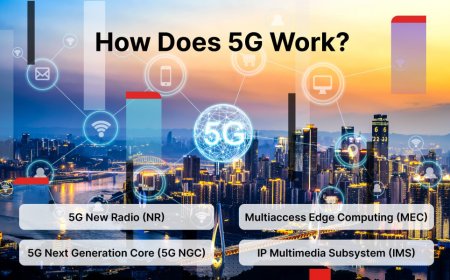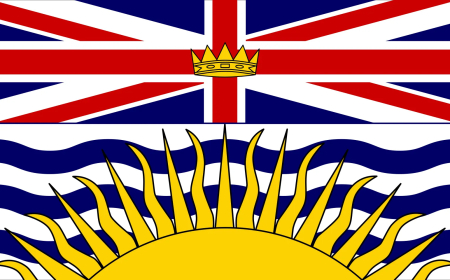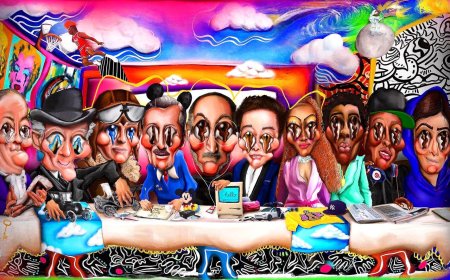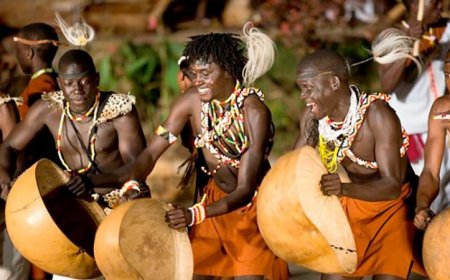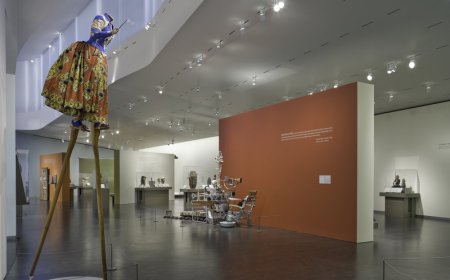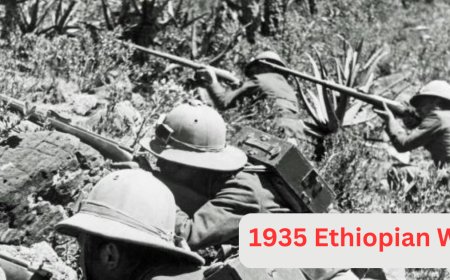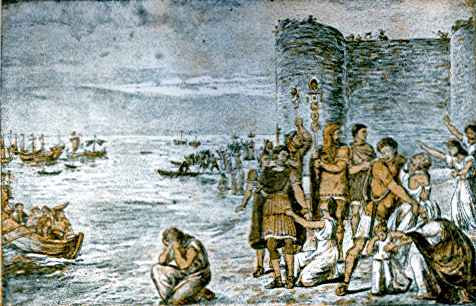The Ghanaian Revolution: From Gold Coast to Ghana's Independence
Explore the Ghanaian Revolution and the journey from Gold Coast to Ghana’s independence. Learn about the key events, figures, and struggles that shaped Ghana’s history."

Introduction: The Road to Independence
Ghana holds a special place in African history as the first black colony on the continent to gain independence. The vision of Kwame Nkrumah and his remarkable organizational skills played a crucial role in this achievement. However, the journey to independence involved a multitude of factors, including Ghana’s unique social, political, and economic landscape in the mid-20th century.
Why Ghana Was the First to Achieve Independence
By the end of World War II, the Gold Coast (now Ghana) was more advanced economically and socially than other African colonies. In 1945, it had a sizable Western-educated elite, including teachers, lawyers, and businessmen, and a history of political activism dating back to the 1860s anti-poll tax movement. However, Ghanaians were dissatisfied with both the lack of constitutional progress and the exploitation of their economy by British firms.
The Gold Coast was the world’s largest producer of cocoa, yet the marketing and pricing of this vital crop were controlled by expatriates. Similarly, the bulk of profits from mining activities flowed to European shareholders instead of benefiting the local economy. The economic situation was compounded by wartime shortages, inflation, and rising discontent among the people, culminating in boycotts of European businesses and riots in 1948.
The Rise of Nationalism and Political Movements
The end of World War II marked a turning point for West African nations. Meyer Fortes recognized the substantial changes in social and economic structures, with the war acting as a catalyst for political reform in Ghana. By 1946, there was a growing belief in the possibility of self-rule for the Gold Coast.
The introduction of the Burns Constitution in 1946, which aimed to give an African majority in the Legislative Council, failed to meet expectations. The system favored traditional chiefs over the educated elite, sparking demands for more radical reform. In response, the United Gold Coast Convention (UGCC) was formed in 1947. While initially an elite group of lawyers and businessmen, the UGCC gained mass support due to the leadership of Kwame Nkrumah, who was appointed General Secretary.
Nkrumah’s Leadership and Vision for Change
Kwame Nkrumah, who had spent the war years in the United States and the United Kingdom, became a key figure in Ghana's independence struggle. His time in London, where he organized the Fifth Pan-African Congress and worked with various African nationalists, shaped his political vision. Nkrumah's pamphlet, Towards Colonial Freedom, articulated the need for political education and the mass organization of colonial subjects, drawing inspiration from Lenin’s theory of imperialism.
In 1949, after the February 1948 riots sparked by police violence against ex-servicemen, Nkrumah’s popularity soared. The riots, which resulted in the deaths of several protesters, galvanized the masses and led to the formation of the Convention People's Party (CPP) in June 1949. Nkrumah's charisma, organizational skills, and oratorical power quickly gained him widespread support, particularly among the working class, unemployed, and lower-level elites.
The CPP’s Path to Power
Nkrumah’s leadership within the CPP led to significant political and organizational advances. Despite opposition from regionalist parties, the CPP’s efforts to push for self-government culminated in the 1951 elections. Although the Burns Constitution was deemed insufficient by Nkrumah, he continued to press for constitutional reform and independence. The CPP won a majority in the 1954 elections, but faced opposition from the Asante-backed National Liberation Movement (NLM) and other regional factions.
In a dramatic move, Nkrumah resigned from his position as Prime Minister in 1954, setting the stage for his return to power. The CPP’s efforts to expand the economy and introduce social reforms, including free compulsory primary education and the expansion of health services, further solidified Nkrumah’s position as the leader of the Gold Coast.
From Gold Coast to Ghana: The Birth of a Nation
On March 5, 1957, the Gold Coast officially became Ghana, marking the first African country to gain independence from colonial rule. The renaming was symbolic, as Nkrumah sought to create a national identity rooted in Africa's rich history. The choice of the name “Ghana,” inspired by the ancient Ghana Empire, reflected Nkrumah’s desire to forge a new African identity that was distinct from colonial legacies.
In his speech during the independence ceremony, Nkrumah expressed hope that Ghana would become a center for the peoples of Africa, a vision that resonated with his Pan-African ideals.
Nkrumah’s Leadership: A Leninist Approach to Governance
After independence, Nkrumah’s leadership style became more authoritarian, influenced by his vision of Ghana as a socialist state. While initially seeking mass participation, his government shifted towards a more elitist approach, with Nkrumah himself at the center of the political power structure. This shift marked the beginning of a personality cult around Nkrumah, with his supporters deifying him as the "Osagyefo" (Redeemer) of Ghana.
As Nkrumah’s rule progressed, his administration became increasingly centralized, and political opponents were suppressed through laws like the Preventive Detention Act, which allowed for the imprisonment of individuals without trial. Despite these tactics, Nkrumah's party, the CPP, continued to dominate the political landscape until the early 1960s.
The Decline of Nkrumah’s Regime
Nkrumah's later years in power were marked by economic difficulties, including falling cocoa prices, and an increasingly isolated political environment. His obsession with his own leadership and the consolidation of power within the CPP led to internal inefficiencies and weakened the party’s organizational health. The imposition of a one-party state, along with the suppression of opposition parties, contributed to growing discontent.
The 1966 Coup and Nkrumah’s Legacy
In 1966, Nkrumah’s government was overthrown in a military coup. Economic mismanagement, combined with his authoritarian rule, led to widespread dissatisfaction. Despite his downfall, Nkrumah remains a key figure in the history of African independence. His vision for a united and self-sufficient Africa continues to inspire leaders and activists across the continent.
Ghana’s Path to Nationhood
Ghana’s journey from the Gold Coast to independence was shaped by a combination of economic exploitation, political activism, and visionary leadership. While Nkrumah’s later years in power were marked by controversy, his role in securing Ghana’s independence and his commitment to Pan-Africanism have cemented his place in history. The lessons from Ghana’s revolution are still relevant today, serving as a reminder of the complexities and challenges involved in the quest for self-determination and nation-building in Africa.
Ghana and Pan-Africanism: Nkrumah’s Vision for a United Africa
On the eve of Ghana's independence, Kwame Nkrumah boldly declared that "the independence of Ghana is meaningless unless it is linked with the total liberation of the African continent." For Nkrumah, liberation did not mean merely political independence for the various small African states. He envisioned their union into a single, powerful African state, one capable of breaking free from the economic neo-colonialism imposed by Western powers. He believed that only through political pan-Africanism could Africa achieve economic freedom from European and North American exploitation.
Pan-Africanism thus became the cornerstone of Nkrumah's foreign policy after 1957. Nkrumah was not merely a theorist; he took bold, practical steps toward achieving African unity. He convened several pan-African conferences in Accra, including the Conference of Independent African States in April 1958, the first in a series of conferences that eventually led to the creation of the Organization of African Unity (OAU) in 1963. However, Nkrumah felt that the OAU, while significant, was too weak to effectively unite Africa.
One of the most notable of these gatherings was the All-African Peoples’ Conference in December 1958, which brought together 62 nationalist organizations from 28 African countries. These conferences were highly symbolic, marking what Tom Mboya referred to as the "rediscovery of Africa." More importantly, they had practical value, inspiring liberation movements across the continent as delegates returned home to continue the fight for independence, often with financial support from the Ghanaian government. Another tangible step toward unity was the creation of the Ghana-Guinea Union in 1958, a significant regional alliance.
Nkrumah's Struggle for Unity and the Challenges He Faced
Ironically, Nkrumah's zeal for pan-Africanism also made him a divisive figure. His uncompromising pursuit of a Union Government for all of Africa and his opposition to regional groupings as forms of "balkanization" alienated other African leaders. His ambition to become the President of a united Africa, coupled with his financial support for dissident movements in several French-speaking African nations, further exacerbated tensions. Ghana became a haven for rebels from francophone Africa, which led many neighboring leaders to view Nkrumah with suspicion.
Ghana and Algeria: A Solidarity with Liberation Movements
Nkrumah’s commitment to pan-Africanism extended beyond Ghana’s borders. His support for liberation movements, such as the struggle for Algerian independence from France, demonstrated his belief in Africa's collective liberation. Nkrumah was one of the first African leaders to unequivocally support Algeria's fight for independence, emphasizing that "Algeria is African and will always remain so." He argued that no historical accident could change the fact that African soil belonged to Africa.
However, many French-speaking African nations were initially reluctant to support Nkrumah's stance, preferring a negotiated solution between Algeria and France. Nkrumah’s disillusionment with these countries grew, especially after the 1958 referendum, where the majority of French West African territories, except Guinea, voted to maintain ties with France. He believed that these states were "client states" under the control of France, a sentiment that deepened as many of them were hesitant to support the Algerian National Liberation Front (FLN).
Nkrumah vs. De Gaulle: The Nuclear Test Crisis
One of the most direct confrontations between Nkrumah and French President Charles de Gaulle occurred over France’s nuclear tests in the Sahara. In 1960, Nkrumah strongly condemned France’s nuclear ambitions, as the tests were conducted in Africa, a region still under the shadow of colonialism. Ghana became the focal point for protests, with Nkrumah organizing a global movement against French nuclear testing.
Nkrumah also took diplomatic action by freezing French economic assets in Ghana and recalling the Ghanaian ambassador to France. He convened a special conference in Accra to discuss Africa’s security and the threat posed by France’s nuclear tests. However, despite his efforts, the issue was only resolved when de Gaulle finally recognized Algeria's independence in 1962, effectively ending France’s colonial presence there.
Ghana and the World: Nkrumah's Non-Alignment
Nkrumah’s foreign policy was characterized by a commitment to non-alignment, seeking to maintain neutrality in the Cold War struggle between the West and the East. In the 1960s, he visited both the United States and communist countries like Eastern Europe and China. Ghana took aid from both sides, reflecting Nkrumah's belief in balancing benefactions to avoid falling into a neo-colonialist trap.
However, Nkrumah was ambivalent about aid from developed countries. He saw aid as potentially reinforcing a neo-colonialist relationship but believed it could be useful if balanced. He used funds from both the West, such as the World Bank, and the East, such as the Soviet Union, to fund projects like the Volta River Project, seeing it as a practical example of non-alignment in action.
The Downfall of Nkrumah: A Legacy of Pan-Africanism and Domestic Challenges
In 1966, while Nkrumah was in China on a peace mission to Vietnam, he was overthrown in a military coup. Nkrumah sought refuge in Guinea, where he was made co-President by Sékou Touré. Although he continued to advocate for pan-Africanism, his influence in Ghana waned. His exile years were spent writing books and learning French, but the call to return to power never came.
Nkrumah’s death in 1972 in Romania, where he was receiving treatment for cancer, marked the end of an era. Although he was buried in Guinea, his body was later returned to Ghana for a state funeral.
Nkrumah’s place in history is complex. He was a visionary pan-Africanist, whose ambition for African unity resonated deeply across the continent. His efforts to keep the spirit of pan-Africanism alive through his leadership and practical steps left an indelible mark on Africa’s liberation struggle. However, his commitment to Africa's unity often overshadowed his focus on Ghana's immediate needs. His domestic policies led to economic challenges, and many Ghanaians found themselves poorer and less free than before independence. Nonetheless, Nkrumah’s role in Ghana’s independence and his advocacy for African unity make him an iconic figure in African history, both as a Ghanaian and as an African.




















